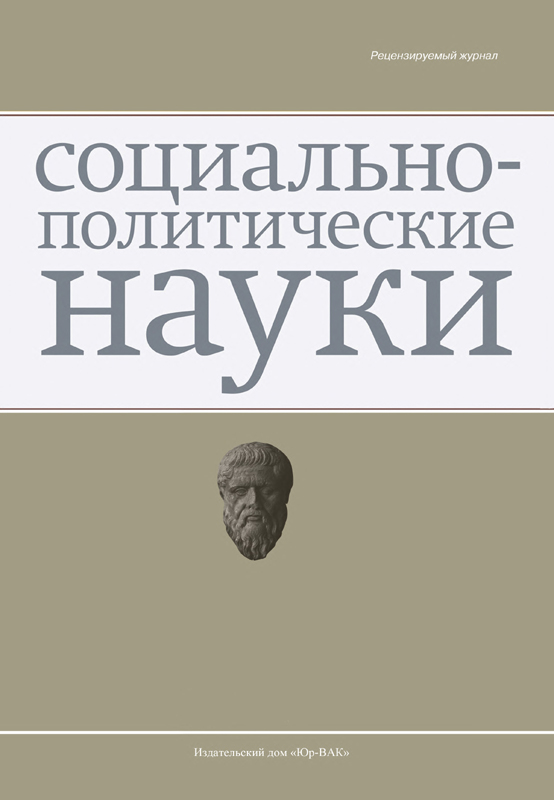Socio-communicative Aspects of Trust Concepts Among Bachelor Students of Moscow Universities
- 作者: Voevodina E.V.1, Ten Y.P.1, Tyurikov A.G.1
-
隶属关系:
- Financial University under the Government of the Russian Federation
- 期: 卷 13, 编号 1 (2023)
- 页面: 119-128
- 栏目: Sociology of Culture
- URL: https://journals.eco-vector.com/2223-0092/article/view/545883
- DOI: https://doi.org/10.33693/2223-0092-2023-13-1-119-128
- ID: 545883
如何引用文章
详细
Interest in the analysis of trust in social communications is due to the fact that modern society is subject to a number of global challenges in economics and politics. Young people, as the most susceptible and labile group of the population, may experience the negative impact of these challenges, coupled with a crisis of values and social guidelines. The purpose of the research is to analyze the perceptions of trust among bachelor students from Moscow universities in the context of social communications. Empirical data are presented by the results of a survey of full-time students living in Moscow and the Moscow Region (n = 441, 2021). The theoretical and methodological basis of the study is formed by the theories of trust of Russian and foreign researchers (F. Fukuyama, Yu. Lo, P.M. Doni, V.Yu. Stolyar, P.M. Kozyreva, S.V. Ryzhova, et al.). The scientific novelty of the study is the identified patterns of the phenomenon of trust in the youth environment. The results of the study show the ambiguity of the interpretation of trust by students. In building trusting relationships, honesty, openness and sincerity are most significant for students. Most consider it impossible to have relationships without trust with relatives and friends. In intercultural communications, it is easier for students to trust post-Soviet citizens. For barriers of trust, the most significant was the socio-cultural barrier (difference in mentality, norms, values, the presence of stereotypes, etc.), as well as the language barrier. The conclusions and recommendations presented in the article can be used in further research on student trust, as well as for making managerial decisions to strengthen the value of trust in education.
全文:
作者简介
Ekaterina Voevodina
Financial University under the Government of the Russian Federation
Email: ekaterinavoevodina@yandex.ru
ORCID iD: 0000-0001-6131-8301
Researcher ID: N-5650-2019
Candidate of Sociology, Associate Professor, associate professor at the Department of Sociology, chief scientific officer
俄罗斯联邦, MoscowYulia Ten
Financial University under the Government of the Russian Federation
Email: YPTen@fa.ru
ORCID iD: 0000-0003-2387-6243
SPIN 代码: 3745-3928
Scopus 作者 ID: 57210258334
Doctor of Philosophy, Professor at the Department of Management and Innovation of the Higher School of Management
俄罗斯联邦, MoscowAlexander Tyurikov
Financial University under the Government of the Russian Federation
编辑信件的主要联系方式.
Email: t-ag2013@yandex.ru
ORCID iD: 0000-0001-8388-9543
Doctor of Sociology, Professor, chief scientific officer at the Department of Sociology
俄罗斯联邦, Moscow参考
- Alyoshin S.V. Trust as a socio-cultural phenomenon: Dis. ... of Cand. Sci. (Philos.). Taganrog, 2012. 148 p.
- Bobkova E.M. Trust as a factor of the integrity of society. Sociological Research. 2014. No. 10. Pp. 70–75. (In Rus.).
- Borisova M.M. Social ideas of youth about trust: Dis. ... of Cand. Sci. (Psychol.). St. Petersburg, 2018. 27 p.
- Trust as a fundamental problem of Russian higher education: Monograph. G.E. Zborovsky (ed.). Yekaterinburg: Humanities University, 2020. 382 p.
- Gelfanova S.V., Lavrov V.N. Trust as a cultural phenomenon. DeloRus. (In Rus.) URL: https://www.delorus.com/medialibrary/detail.php?ID=1896 (data of accesses: 30.05.2021).
- Kozyreva P.M. Interpersonal trust in the context of the formation of social capital. Sociological Research. 2009. No. 1. Pp. 43–54. (In Rus.)
- Kochetkov P.N. On the differences between the concepts of “trust” in the Russian-speaking and English-speaking pictures of the world. Volga Scientific Bulletin. 2005. No. 6-3 (46). Pp. 88–92. (In Rus.)
- Ryzhova S.V. Trust and ethnic tolerance in the context of social change. Sociological Journal. 2016. Vol. 22. No. 1. Pp. 72–94. (In Rus.)
- Ryzhova S.V. Religiosity in the context of a culture of trust. Sociological Journal. 2017. Vol. 23. No. 3. Pp. 44–63. (In Rus.)
- Sinyavina N.V. Trust as a concept in the context of a cultural approach. Bulletin of the Moscow State University of Culture and Arts. 2020. No. 1 (93). Pp. 26–31. (In Rus.)
- Stolyar V.Yu. Trust as a phenomenon of socio-economic reality: Abstract of dis. ... of Cand. Sci. (Philos.). Tver, 2008. 21 p.
- Terin D.F. The construction of political trust in Russia: The effectiveness and fairness of political institutions. Sociological Journal. 2018. Vol. 24. No. 2. Pp. 90–109. (In Rus.).
- Ten Yu.P. Trust as a factor contributing to overcoming cross-cultural barriers in international business. Proceedings of the South Western State University. Series: Economics. Sociology. Management. 2021. No. 11. Pp. 261–270. (In Rus.)
- Tyurikov A.G., Proskurina A.S. Evaluation of the effectiveness of intercultural communication as a process of exchange of information resources. Search: Politics. Social Studies. Art. Sociology. Culture. 2021. No. 2 (85). Pp. 58–68. (In Rus.)
- Fukuyama F. Trust: Social virtues and the path to prosperity. Moscow: AST; Ermak, 2004. 730 p.
- Doney P.M., Cannon J.P., Mullen M.R. Understanding the influence of national culture on the development of trust. Academy of Management Review. 1998. No. 23. Pp. 601–620.
- Li P. Intercultural trust and trust-building: The contexts and strategies of adaptive learning in acculturation // Handbook of advances in trust research. Cheltenham: Edward Elgar, 2013. Pp. 146–173.
- Luo Y. Building trust in cross-cultural collaborations: Toward a contingency perspective. Journal of Management. 2002. No. 28 (5). Рp. 669–694.
- Pudelko M., Li J. The Role of trust in cross-cultural management. Handbook of contemporary cross-cultural management. B. Szkudlarek, L. Romani, D.V. Caprar, J. Osland (eds.). London: SAGE, 2020.
补充文件














